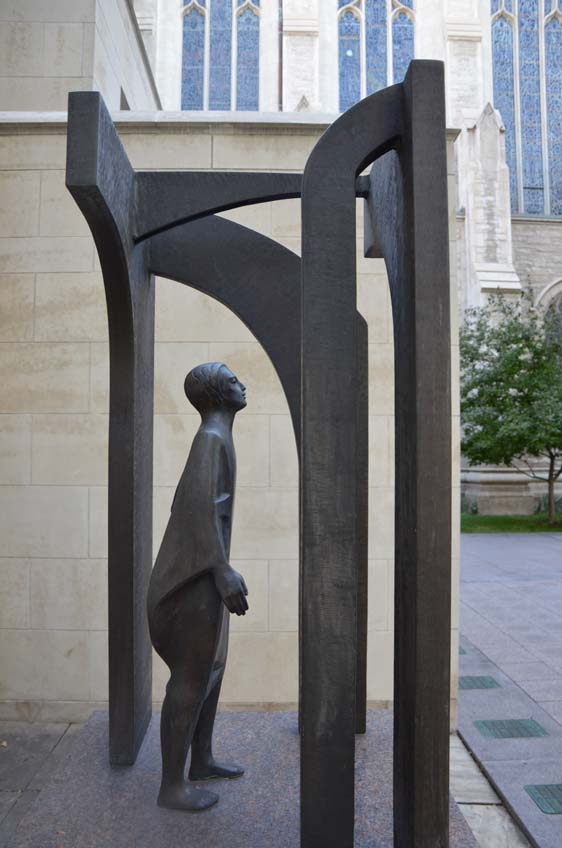
If Kai and I walk out over the pasture behind our New Hampshire farmhouse, past the vegetable gardens and past the bee hives into the edge of the trees on the bluff, we can see the Blackwater River down below, along which bees will soon fly. We can see the water and the near shore, but the distant river’s edge is obscured even in the treeless hinge between winter and spring. Our side of the river is evident, but the other side is murky, shrouded in questions unanswered. I Remember the view along the Blackwater in spring’s cold air with its scent of wood-burning stoves and the hint of a rosemary chicken in the oven. Here too we sit as a church, within the scent of a meal we have been having these last years and yet aware that something new is coming. Something is over there, beyond the fog that clings tenaciously to the river.
Poetry is full of references to distant shores for good reason. They can be scary. They can be alluring. In such a circumstance, what is called for is a thoughtful, careful process leading to uncovering what lies ahead through listening, praying, and then making a choice. This kind of essential work is what is known as discernment. But discernment is not widely valued in our culture. Our society loves the quick fix. Fast food. Easy money. News summaries — no need to read too much. Commercials — fast and punchy. Powerful images and words designed to win favor by fear or allure – either is fine. Just the facts, please. Gotta run. Eye on the prize. Other eye on the cell phone…keep an eye on the little light on the phone, listen for a beep, a buzz, a ring, anything that says I am not alone. Some say we are as a society becoming hypervigilant from too much CNN, and ADHD’ed (Attention Deficit Hyperactivity Disorder) from caffeine and cell phone notifications. It’s a dangerous combination of distractions.
Stores place things strategically so that in a daze of choices, we will pick the one they want us to pick (the expensive one) by a combination of attractive, clever labels and shelf placement. In fact, the square tiles on the floors of supermarkets are different in size in the aisles. When they want you to slow down, the tiles get smaller and more numerous. When they want you to speed up, the tiles are larger and fewer. The eye and the brain’s subconscious are used to the standard tile-size elsewhere in the store and to its pace-setting quality. When the tile sizes change along certain aisles, we are tricked into slowing down, lingering near pricey items. We think to ourselves…“Oh, coffee, yes, I need some. Oh. Pricey. Cool label art! Oh well, I am here. Might as well grab some…” They do it because it works.
Discernment is a fancy spirituality word for holy choice-making. Discernment means making a slow, careful choice in the context of God’s hope for us. Discernment works against impulse-buying. It works against tag-team maneuvering, manipulation and backroom deals wrapped in shiny bows. Discernment pulls the legs out from under politics and exposes insider sales jobs. Discernment kicks the tires and orders the Carfax record!
In the process of choosing something, there may be a subconscious tendency for the choosing person or community to be fearful of choice-making. What if I choose wrong? There are some basic ways, finding essentials that move one from a place of list-making to a place of active, Holy Spirit choice-making. Here are the Top Ten from the church matriarchs and patriarchs of the past two millennia:
1. Attend to a balanced life before making a choice, so you are well-rested, well-nourished, engaged in friendships, and keeping time for prayer and silent reflection.
2. Keep a regular time of wordless prayer where you simply sit and listen to a God who longs for time with
you. Do not expect messages. Silence pays off later.
3. Pay less attention to what people say about themselves and more attention to how the Holy Spirit seems
to be moving in you.
4. Trust your gut.
5. If someone is manipulative, turn away and pray.
6. Do not be afraid. Fear can immobilize you, distract you, or erode your trust in yourself.
7. Jesus comes as the “Word” so words are important.
The root word of our church denomination is instructive and helpful regarding discernment. “Episcopus” is a combination of “epi” and “scopus.” Scopus, like telescope and
microscope, is used to look at things up close and intensely, so be looking for an attentive listener.
8. The verb form of “episcopus” means to visit, but because of its noun root, it is a visit of careful attention and presence-making.
9. Plumb your line always back to truth, love and kindness, using these as your measure.
10. Practice Holy Spirit-guided mindfulness.
Discernment in a market, or on the riverbank of a life-choice is essential to making a good choice but not essential to making a choice. May God’s Spirit lead us into good choices.


